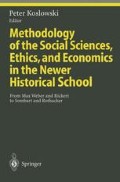Abstract
I should like to start by asking two questions:
-
(1)
What is Georg Simmel’s2 contribution to economics?
-
(2)
What is his contribution to our theoretical conception and general understanding of the economy?
Earlier work on Simmel and systems theory was supported by the Fritz Thyssen Foundation (Cologne, Germany). I have benefitted greatly discussions with my colleage Vladimir Gligorov (WIIW), Vienna. Translation into English by Silvia Plaza.
Access this chapter
Tax calculation will be finalised at checkout
Purchases are for personal use only
Preview
Unable to display preview. Download preview PDF.
References
Arrow, K.J. (1959): “Toward a Theory of Price Adjustment”, in: M. Abramovitz Et Al. (Eds.): The Allocation of Economic Resources, Stanford, California (Stanford University Press).
Backhaus, I. (1996): “Korreferat zu Raimund Dietz”, see R. Dietz (1996).
Baranzini, M., Scazzieri, R. (Eds.) (1986): Foundations of Economics, Structures of Inquiry and Economic Theory, Oxford (Basil Blackwell).
Binswanger, H.C. (1985): Geld und Magie — Deutung und Kritik der modernen Wirtschaft, Stuttgart (Thienemann).
Blnswanger, H.C. (1994): “Geld und Wachstumszwang” in: H. C. Binswanger, P. V. Flotow (1994) (Eds.): Geld und Wachstum, Stuttgart (Weitbrecht), pp. 81–124.
Blaug, B. (1985): Economic Theory in Retrospect, Cambridge (Cambridge University Press), fourth Edition.
Buchanan, J.M. (1979): What Should Economists Do?, Indianapolis (Liberty Press).
Coase, R.H. (1988): The Firm, the Market and the Law; Chicago, London (The University of Chicago Press).
Coser, L. (Ed.) (1965): Georg Simmel, Englewood Cliffs, New Jersey (Prenticehall).
Dletz, R. (1995): Tausch, Geld und ökonomische Rationalität — Ein von Georg Simmel angeregter Beitrag zur Theorie der Wirtschaft, Manuskript, Vienna.
Dletz, R. (1996): “Tausch und Geld — Zur Entstehung der Geldwirtschaft als Ordnung”, in: D. Cassel (Ed.): Entstehung und Wettbewerb von Systemen, Berlin (Duncker & Humblot).
Ees, H.V., Garretsen, H. (1992): Institutional and Conventional Aspects of a Monetary Economy (and the Usefulness of Game Theory), mimeo, Univ. of Groningen.
Flotow, P.v. (1992): Georg Simmeis “Philosophie des Geldes” als ökonomisches Werk, Dissertation Hochschule St. Gallen, Nr. 1327.
Frankel, H.S. (1977): Money: The Conflict of Truth and Authority, Oxford (Blackwell).
Garegnani, P. (1990): “Quantity of Capital”, in: Eatwell e.al. (Eds.): The New Palgrave, New York-London (W.W. Norton), pp. 1–78.
Gusel, P. De, Haslinger F. (1993): “Quantitative versus qualitative (Nicht-)Neutralität des Geldes: Anmerkungen zu einer nicht überwundenen Dichotomie”, in: Stadermann/Steiger (1993) (Eds.), pp. 109-120.
Hahn, F. (1982): Money and Infltion, Oxford (Basil Blackwell).
Hayek, F. A. (1945): „The Use of Knowledge in Society“, AER, Vol. 35/4. German: Hayek (1952), pp. 103–121.
Hayek, F. A. (1952): Individualismus und wirtschaftliche Ordnung, Erlenbach-Zürich (Eugen Rentsch Verlag).
Hellwig, M. F. (1984): „The Challenge of Monetary Theory“, European Economic Review, 37, pp. 215–242.
Hirshleifer, J. (1985): “The Expanding Domain of Economics”, AER (1985/2), December, pp. 53-68.
Jung, W. (1990): Georg Simmel zur Einführung, Berlin (Junius) 1990.
Laidler, D., Rowe, N. (1980): “Simmer’s Philosophy of Money: A Review Article for Economists”, Journal of Economic Literature, 18 (March 1980), pp. 97–105.
Lavoie, D. (1985): Rivalry and Central Planning. The Socialist Calculation Debate Reconsidered, Cambridge (Cambridge University Press).
Levine D.N. (Ed.) (1971): Georg Simmel — On Individuality and Social Forms, Chicago/London.
Marx, K. (1968): Das Kapital, Band 1, MEW Band 23, Berlin (Ost).
Menger, C. (1871): Grundsätze der Volkswirtschaftslehre, in: F. A. Hayek (Hg.): The Collected Works of Carl Menger, Vol. I, London (University of London) 1934.
Menger, C. (1909): Schriften über Geld und Währungspolitik, in: F. A. Hayek (Hg.): Carl Menger Gesammelte Werke, Bd. IV, Tübingen (J.C.B. Mohr [Paul Siebeck]) 1970.
Morgenstern, O. (1972): “Thirteen Critical Points in Contemporary Economic Theory: An Interpretation”, Journal of Economic Literature, 10/4, pp. 1163–1189.
Myrdal, G. (1953), The Political Element in the Development of Economic Theory, London (Routledge & Kegan).
North, D. C. (1991): “Institutions”, Journal of Economic Perspectives, 5/5, pp. 97–112.
Ostroy, J. M., Starr, R. M. (1990): “The Transactions Role of Money”, in: Kenneth J. Arrow (Ed.): Issues in Contemporary Economics, Vol 1: Markets and Welfare, Houndmills (Macmillan), pp. 3–59.
Ötsch, W. (1991): “Gibt es eine Grundlagenkrise der neoklassischen Theorie?”, Jahrbücher für Nationalökonomie und Statistik, 208/6, pp. 642–656.
Parson, T., Shils, E. (1951): Toward a General Theory of Action, Cambridge, Mass.
Patinkin, D. (1965): Money, Interest and Prices, 2nd ed., New York (Harper & Row).
Rammstedt, O. (1994): Geld und Gesellschaft in der “Philosophie des Geldes”, in: H.C. Binswanger und P. v. Flotow (Eds.): Geld und Wachstum, Stuttgart (Weitbrecht).
Riese, H. (1983): “Geldökonomie, Keynes und die Anderen, Kritik der monetären Grundlagen der Orthodoxie”, Ökonomie und Gesellschaft, Jahrbuch 1, pp. 103–160.
Schnabel, P.-E. (1985): “Georg Simmel”, in: A. Kuper, J. Kuper (Eds): The Social Science Encyclopedia, London, Boston (Routledge & Kegan Paul), pp. 750–751.
Schumpeter, J.A. (1943): Capitalism, Socialism and Democracy, Fifth Edition, London (George Allen & Unwin) 1976.
Simmel, G. (1900/1907): Die Philosophie des Geldes, 6. Auflage, Berlin (Duncker & Humblot), 1958. English: The Philosophy of Money, edited by D. Frisby, translated by Tom Bottomore and David Frisby, New York (Routledge) 1990.
Stiglitz, J., (1990): Wither Socialism? Perspectives from Economics of Information, Wicksell Lectures, Stockholm, May 1990.
Streit, M., Wegner, G. (1993): “Information, Transactions, and Catallaxy: Reflections on Some Key Concepts of Evolutionary Market Theory”, mimeo, Jena 1993.
Sudgen, R. (1991): “Rational Choice: A Survey of Contributions from Economics and Philosophy”, The Economic Journal, 101, pp. 751–785.
Trier-Mayntz, R. (1990): “Georg Simmel”, in: D. L. Sill (Ed.): International Encyclopedia of the Social Sciences, London, pp. 251-257.
Vanberg, V. (1994): “Cultural Evolution, Collective Learning, and Constitutional Design”, in: D. Reismann (Ed.): Economic Thought and Political Theory, Boston (Kluwer Academic Publisher), pp. 171–204.
Editor information
Editors and Affiliations
Rights and permissions
Copyright information
© 1997 Springer-Verlag Berlin · Heidelberg
About this paper
Cite this paper
Dietz, R. (1997). Georg Simmel’s Contribution to a Theory of the Money Economy. In: Koslowski, P. (eds) Methodology of the Social Sciences, Ethics, and Economics in the Newer Historical School. Studies in Economic Ethics and Philosophy. Springer, Berlin, Heidelberg. https://doi.org/10.1007/978-3-642-59095-5_5
Download citation
DOI: https://doi.org/10.1007/978-3-642-59095-5_5
Publisher Name: Springer, Berlin, Heidelberg
Print ISBN: 978-3-642-63849-7
Online ISBN: 978-3-642-59095-5
eBook Packages: Springer Book Archive

